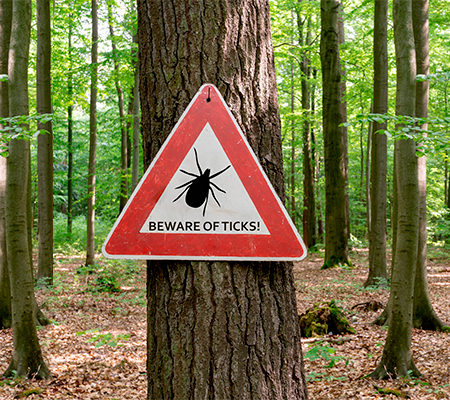
Signs might not be everywhere ticks are but to protect yourself from tick bites, be aware when you’re in areas that abound with the creatures.
If you live or play in wooded areas, near areas with tall grasses or habitat popular with woodland creatures, you know ticks that carry disease may abound.
For example, Lyme disease is transmitted to humans through tick bite. Symptoms are fever, headache and fatigue and skin rash. If not treated, infection can spread to joints, the heart and nervous system. Most cases can be treated with antibiotics.
But, according to Jennifer Meece, Ph.D., ticks can carry other diseases more difficult to diagnose and treat. One is Powassan virus, named after Powassan, Ontario, where a young boy died from the virus. Though rare, Powassan is found in the U.S., primarily in the northeast and Great Lakes regions typically in late spring, early summer and mid-fall when ticks are most active.
Meece is a tick-borne disease expert and directs the Integrated Research and Development Laboratory, Marshfield Clinic Research Institute. Laboratory staff performs research on infectious diseases like blastomycosis, influenza and vector-borne diseases.
Number of cases grows
Powassan is an emerging pathogen, Meece said, and researchers are seeing an expansion in the geographic location of some types of ticks. According to research published in Frontiers in Public Health, a total of 27 Powassan cases from 1958-98 were reported while there were 98 cases from 1999 to 2016.
“The range of ticks is changing as our environment changes,” she said. “Different ticks are expanding their footprint in North America and surviving over winter in places they couldn’t before. For example, the lone star tick used to be only in the south. We now have it in Wisconsin.”
“Also, the more you look for something the more you find,” she said. “Awareness increases, so as research is published we start to think about it more and we’re seeing reported cases of people sick with Powassan virus have increased.”
Illness can be severe
Time from tick bite to illness is about a week to a month. The virus can infect the central nervous system and cause inflammation of the brain and meningitis, inflammation of membranes surrounding the brain and spinal cord.
Many people who become infected do not have symptoms, Meece said. Symptoms, though, can include fever, headache, vomiting, weakness, confusion, loss of coordination, speech difficulties and seizures. Those with severe illness often need to be hospitalized to get support with breathing and swelling in and around the brain. About half of survivors have permanent neurological symptoms, like recurrent headaches, muscle wasting and memory problems. About 10% of virus encephalitis cases, where there is infection in the brain, are fatal.
Powassan virus is tough to diagnose, Meece said, “and it’s so rare it’s not the first thing providers think about. Also, tests for it are not as commercially available. We rely on tests available to public health laboratories.”
There is no vaccine or antiviral drug treatment, yet. People who think they may have this virus or other tick-borne diseases should see their primary care provider.
Stay one step ahead
The key is to be proactive, Meece advises. Protect yourself from all ticks for all reasons and all preventive rules apply:
- Avoid dense wooded areas and areas covered with tall grass.
- Wear light-colored clothing, including long sleeves and tall socks, which covers all your skin so you find ticks before they attach to your skin.
- Do self-checks every time after outside activities. Have a friend or family member check you for ticks and vice versa.
- Use insect repellent or pesticides.
- Remove ticks promptly.
- Consider buying clothing, footwear and outdoor gear pre-treated with repellent containing permethrin.
- Protect pets. Use a tick or insect repellent. In animals, symptoms may not be present for seven to 21 days. Monitor your pet closely and do full-body checks.


Use scotch tape. Sticky side on the tick, then fold the tape over, sticky sides together with the tick encapsulated in-between.
Easy to identify the type of tick, and it sure beats wondering where the creepy critter crawled away to while you were looking for a 'jar' or container.
Hi Julie,
Thanks so much for reading Shine365 and for that helpful tip.
Here is another blog post we have on the topic of ticks, if you are interested: https://shine365.marshfieldclinic.org/wellness/tick-borne-diseases-and-genetic-testing/
Thanks,
Jake
Not once was the specific tick vector mentioned. It is the deer tick (now known as the black legged tick) that also vectors Lyme disease. It is not transmitted by the dog tick (wood tick) or lone star tick.
Thank you for commenting Darwin.
If you are interested, here is another Shine blog post we have on the topic of ticks: https://shine365.marshfieldclinic.org/wellness/tick-borne-diseases-and-genetic-testing/
Thanks,
Jake
Sometimes it helps if you save the tick in a jar and take it to the clinic. Depending on what kind of tick it is, it helps them decide whether or not to treat this way or that for what might be.
Hi Michael,
We appreciate you reaching out. That's a helpful tip — thanks for reading Shine365!
-Jake